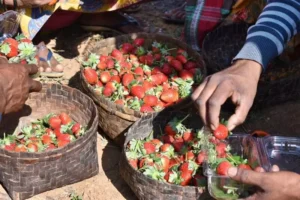Even spooning honey into that chilled nimbu paani on a hot day, or adding it to the cup of hot tea on a cold one is an unhurried act of delicious anticipation. And, honey is indispensable in swallowing that bitter medicine!
Pure honey is exactly how mother Nature intended us humans to consume it, unadulterated, slowly and serenely.
“There is a long and delicious list of honeys,” said Nimit Singh, a 30-year-old beekeeper who has his own brand called Madhumakhiwala that he markets from Lucknow in Uttar Pradesh.
Also Read: Beekeeping gives the Santhal tribal women in Banka, Bihar, a sweet taste of success
“I studied engineering, but wanted nothing to do with a nine to five job. What I wanted was the excitement of starting my own enterprise from scratch. My father who is an army veteran told me about beekeepers he had seen at work when he was posted in Punjab, and I was hooked,” Nimit recalled.
Nimit Singh’s father is an army veteran who has travelled across the length and breadth of the country. Nimit chose travel too, but he decided to take a less fauji route, but one which was no less rigorous for it.
The 30-year-old is a honeymaker and the proud owner of a brand he calls Madhumakhiwala that he registered in 2016.
“Beekeeping also made sound business sense to me. It required no great investment. One can even start with something as little as Rs 5000. And, it did not demand I have my own lands. Finally, the end product, the honey my honey bees made, had no shelf life and I would not have to worry about it spoiling,” Nimit told Gaon Connection.
But, before he set up his enterprise, Nimit embarked on a journey of discovery, where he travelled far and wide to meet, observe and learn from beekeepers. He spent two years watching expert honey makers in the country tending to their bees.
“I decided to spend at least a week with each beekeeper I met, and Pipiganj in Uttar Pradesh, was my first stop where Rajeev Singh, a beekeeper of considerable experience gave me the first taste of apiculture. He taught me about bees, their characteristics and about challenges,” Nimit recollected.
Also Read: Approaching winters are busy times for both bees and the bee-keepers
That was in the year 2012, after which he went to Rajpura in Punjab where beekeeper Lal Bahadur Bhatia also taught him the nuances of beekeeping.
By the time he had travelled from the shores of Kanyakumari to the mountains of Kashmir, from Odisha and Bengal in the east to Sikkim and Nagaland in the North East, there was little about beekeeping that Nimit did not know.
“I wanted to know the inside out of the enterprise. I knew I may not be able to afford staff initially. And, even if I did, I wanted to be in the position that I knew every aspect of bee keeping so that no one could take me for a ride,” he said.
In the process of learning about the nuts and bolts of beekeeping, Nimit said he also learnt valuable life lessons. “To start with I learnt how to pitch a tent,” he laughed. That was important as he began to spend more and more time in the outdoors with just a tent to sleep in. He also learnt about human psychology. “I befriended farmers in villages. I learnt about gratitude. They generously let me set up my boxes on their farms, and many, many of them even refused to take anything from me in return for their hospitality,” he said. “I worked as free labour in return for what these beekeepers taught me,” he said.
Nimit got his own first consignment of 50 bee boxes from West Bengal. But he learnt that the beekeeping business was not without stings. “I lost bees, my honey did not sell, banks turned me away…but I survived,” he smiled.
There is passion in Nimit’s voice as he describes honey. “No two honeys are the same. The flavours, and notes vary depending on where the bees make their honey. So bee boxes kept in a field in Muzaffarpur yield honey that carries the delicate notes of litchi so famous in that region. Or those from the Sundarbans have the fragrance of wildflowers, and if the bee boxes were in a field of mustard in Punjab, the honey would definitely let you know it was made there,” he said.
Each bee box that could have anything between 50,000 to a lakh of bees in it yields 25 kgs honey and one kg of beeswax in a period of six months. “We chase the flowers,” Nimit smiled. And keep moving the boxes to where the flowering is happening”.
From November to March, Nimit’s 250 beeboxes will be busy in Barabanki in Uttar Pradesh where the mustard and the eucalyptus will be in bloom. “In March I move them to Muzaffarpur where my bees borrow the flavours from the litchi for the honey. Next is Jharkhand for wildflower honey, Sundarbans for multi flowered ones and then Odisha for the til or sesame flower honey. Then we start all over again in Barabanki…”.
Nimit’s first batch of honey came from bee boxes he had placed at a friend’s farm in Misrikh, Sitapur in Uttar Pradesh. “I would shift the boxes to farms that were willing to allow me to keep them. In many places I would leave the farmer 25 kgs of honey as a thankyou for their generosity,” he said.
Nimit’s approach to marketing his honey was novel. “I had no success selling it initially. But, I decided to pack some of the honey in bottles and head out on my bike. I approached those people out on their morning walks, knowing they were health conscious and would probably be interested in the honey,” Nimit laughed. So, he set out early in the morning with samples of his honey and handed them out to them. It worked and gradually the demand for his honey grew.
Today, he owns 1000 bee boxes, an acre of land he has bought in Rajauli village, Fatehpur Block, Barabanki and he has a network of friendly farmers and beekeepers who allow him space in their farms to keep his beeboxes. His bees make him 10 different flavours of honey. Eucalyptus honey is the most popular.
Today, Nimit, taking a leaf out of the lives of all those large hearted people who helped him along on his beekeeping journey, is doing the same with 250 women of 114 families in Chainpurva village in Barabanki. He provides the women beeswax, out of which they make diyas and earn a livelihood. “Last year, in a month alone before Diwali the women made 9 lakh diyas. This year they have made 9.5 lakh diyas, which people from the village that we have trained, sold at different outlets in Lucknow,” Nimit said.
Also Read: Apple and litchi production likely to get affected as honey bees are “locked up” inside their boxes
Philosophising about his business, Nimit said, “The life cycle of a worker bee is 45 days, while the queen bee lives for three years. In their short and hard working lives they produce so much sweetness.”
“I learnt that without bees there would be no planet earth; we wouldn’t exist,” Nimit added, and that, he said, was all the incentive he needed to put his heart and soul in his enterprise.



















